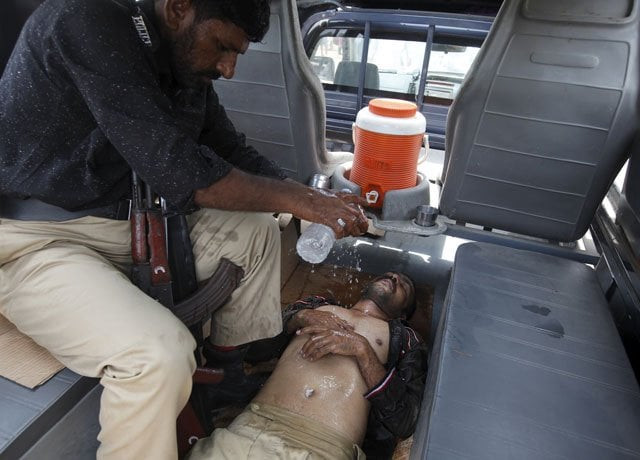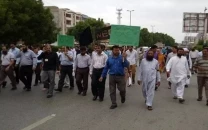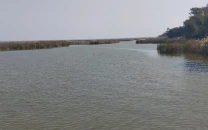Modernising meteorology
PMD is outdated in its methodology and lacks the tools required to track weather conditions as they develop

A policeman sprinkles water on a colleague who collapsed due to heat outside JPMC on Wednesday. PHOTO: REUTERS
Given the rapid climate change we are seeing across the world, which also affects our region, this is nothing short of a disaster. Experts have pointed out that the heatwave that swept across northern India a month ago, claiming nearly 2,500 lives should have acted as a warning that we could face similar conditions in our country soon. This did not happen and one of the outcomes is the pall of death which hangs over Karachi. There have also been warnings from experts that the heatwave we are seeing could trigger heavy rains in various parts of the country, unleashing flash floods and hill torrents. We know what damage such phenomena can cause. The importance of having the ability to more or less accurately forecast extreme weather events cannot be emphasised enough. It is essential that the PMD is fully equipped to do this and send out alerts which can then enable the authorities to institute preventive measures to save lives, as well as create awareness among the public regarding any possible dangers that may lie ahead. Beyond the issue of technology, there is also the question of political will. When forecasts are made, it is important that administrations then act on them quickly, evacuate people when necessary and do everything possible to save lives and property. This may not always be possible, but modern science makes it feasible. We need a properly devised rescue plan to deal with such hazards. With the impact of climate change becoming increasingly apparent the world over due to global warming, it has become all the more necessary that we depend on accurate forecasts based on scientific means rather than on traditional patterns of weather remaining intact, which is no longer likely to happen.
Published in The Express Tribune, June 25th, 2015.
Like Opinion & Editorial on Facebook, follow @ETOpEd on Twitter to receive all updates on all our daily pieces.



















COMMENTS
Comments are moderated and generally will be posted if they are on-topic and not abusive.
For more information, please see our Comments FAQ